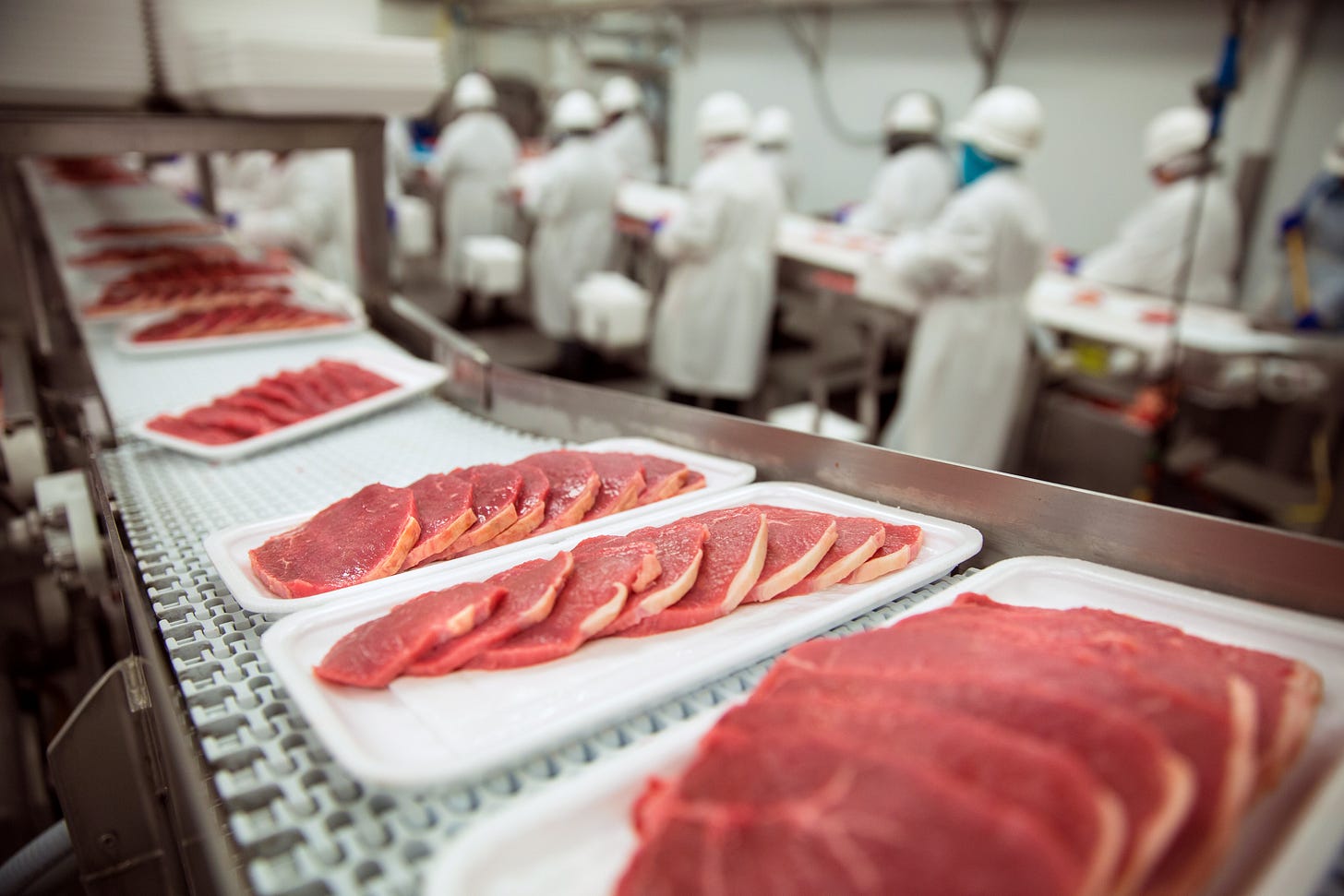In the shadow of the early 20th century, Upton Sinclair's "The Jungle" shed light on the dark underbelly of the American meatpacking industry, revealing harrowing conditions endured by workers. Fast forward to the 21st century, and the narrative around the meat industry encompasses not only environmental and animal welfare concerns but also continues to highlight significant human rights abuses.
‘‘Americans have no idea where their meat comes from. That’s hurting us, and it’s also making others rich and hurting so many of these workers.’’ - Chloe Sorvino, highlighting the hidden costs and exploitation within the meat industry, emphasizing the disconnect between consumers and the source of their food.
This article aims to uncover the historical context of meat production, its evolution into a global powerhouse, and the persistent human rights violations within, urging for a systemic overhaul for a more equitable and humane food system.
Historical Evolution of the Meat Industry
Ancient Beginnings to Industrial Revolution: Tracing back to a 1,700-year-old butcher shop in Devon, UK, humans have consumed meat for millennia. However, the industrial meat production we recognize today began in the mid-1600s in Massachusetts, transforming dramatically with technological advancements like refrigerated transport and the rise of meatpacking giants.
The Rise of Meat Giants: The 20th century saw the centralization of meat production in the hands of a few large corporations in the U.S., such as Cargill and Tyson Foods. This shift marked the decline of local farms and the beginning of mass-produced meat, raising billions of animals yearly with a significant environmental footprint.
Contemporary Challenges in the Meat Industry
Environmental and Health Implications: The meat industry is a major contributor to global emissions, deforestation, and pollution. The relentless demand for meat not only exacerbates climate change but also poses risks to public health through the spread of zoonotic diseases.
Human Rights Abuses Persist: Echoing Sinclair's exposé, modern investigations reveal that exploitation and abuse remain rampant in the meat industry. Workers, often immigrants or refugees, face hazardous conditions, inadequate pay, and blatant disregard for their welfare.
The Human Cost: A Closer Look
Exploitation of Vulnerable Workers: Investigative journalist Chloe Sorvino highlights the systemic exploitation within the industry, with cases of discrimination, unsafe working conditions, and inadequate healthcare [1]. Major companies like JBS have been implicated in numerous human rights violations, including employing child labor [2].
The Pandemic Exposes Deep Flaws: COVID-19 outbreaks in meatpacking plants worldwide spotlighted the industry's inherent issues, from overcrowded working conditions to the neglect of workers' health, further illustrating the need for systemic change [3].
Pathways to Accountability and Reform
Systemic Overhaul vs. Legal Action: While lawsuits can bring temporary relief to victims, they do not address the root causes of exploitation in the meat industry. A fundamental transformation toward a more ethical and sustainable food system is necessary to mitigate the human cost of meat production.
Embracing Local and Plant-Forward Systems: Shifting away from centralized meat production to support local, plant-based food systems can alleviate the strain on workers, animals, and the environment. This approach also tackles food insecurity by improving access to healthy and affordable foods in underserved communities.
The Role of Policy and Consumer Choice: Real change requires action from both policymakers and consumers. While individual choices matter, systemic reform initiated by government regulations and corporate accountability will have a more substantial impact on improving the meat industry's ethical standards.
Conclusion
The story of meat production is not just about food; it's a complex narrative of environmental, animal, and human welfare. As we look beyond our plates, it becomes clear that the cost of meat extends far beyond its price tag, reflecting deeply ingrained issues of exploitation and inequality. By advocating for systemic changes and supporting more sustainable and ethical food production models, we can begin to address these challenges, creating a more just and compassionate world for all.
Sources:
Sorvino, C. (2020). "Pigs of Capital: Exploitation in the Meatpacking Industry." https://www.bostonglobe.com/2023/06/04/opinion/letters-to-the-editor-pigs-suffering-will-continue/
Mielke, J. (2022, April 6). "JBS Hit With Lawsuit Alleging It Knowingly Employed Minors at Nebraska Plant." Food & Wine https://www.foodsafetynews.com/2022/11/jbs-caught-using-child-labor-for-overnight-sanitation-services-contractor-called-into-federal-court/
The Atlantic. (2020, April 16). "Why Are Coronavirus Outbreaks Hitting Meatpacking Plants So Hard?" https://www.theatlantic.com/ideas/archive/2020/05/essentials-meatpeacking-coronavirus/611437/
Visit Our Amazon Store!
All sales of our Vegan Products help promote animal rights worldwide!
General Resources
Books:
Dominion: The Power of Animals in Nature and in Our Imagination by Matthew Scully
Animal Liberation by Peter Singer
Eating Animals by Jonathan Safran Foer
A Billion Hungry Mouths: Feeding the World Without Consuming the Planet by Colin Tudge
Websites and organizations:
Documentaries:
Articles:
"The Case for Animal Rights" by Tom Regan
‘‘Why We Love Dogs, Eat Pigs, and Wear Cows: An Introduction to Carnism’’ by Melanie Joy
‘‘Animal Rights: The Abolitionist Approach’’ by Gary L. Francione
‘‘Fellow Creatures: Our Obligations to the Other Animals’’ by Christine Korsgaard
Seeds of Compassion: Finding Jesus Christ in a Vegan World by Michael Corthell
Receive a single informative article daily at 12:01 AM by email. Explore my homepage with exciting vegan and plant-based news content and delightful and delicious recipes for additional updates. Stay connected to the vegan world and all it has to offer.
Visit The Vegan Project Global our Facebook page for more vegan outreach and education.
Also, visit our new YouTube channel
The information on this vegan/plant-based blog is for general informational purposes only. It is not intended as legal, medical, or professional advice. Readers should consult with appropriate professionals for specific advice tailored to their situation. The blog owner is not responsible for any reliance on the information herein.






Hi Michael - great piece, and very important topic! And what a coincidence: I'm actually working on a very similar piece at the moment. But I guess that can't hurt. The more exposure, the better!